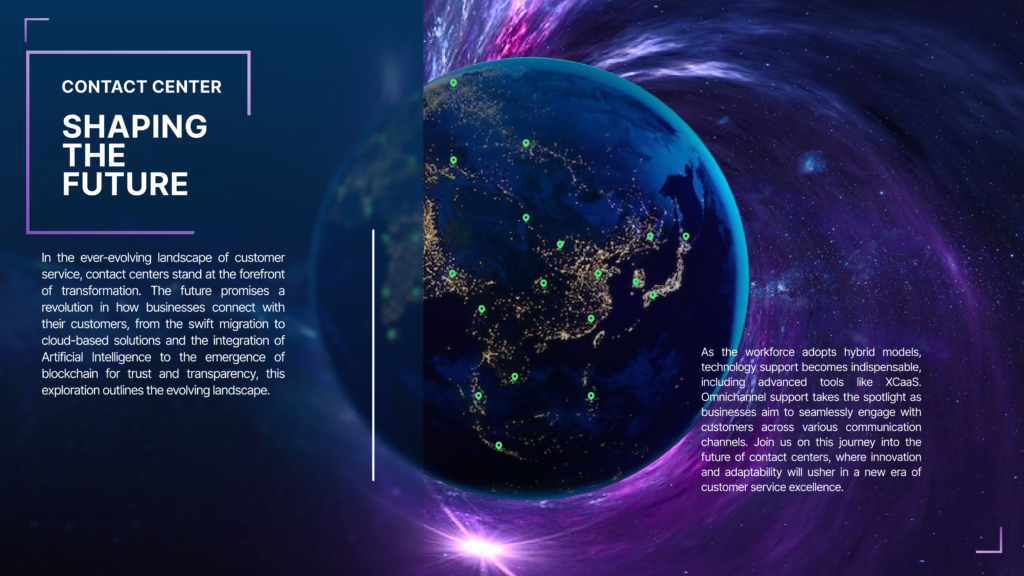Evolving Contact Center: A Glimpse into the Next 5 Years

The world of customer service is undergoing a profound transformation, and the contact center landscape is at the heart of this evolution. Over the next five years, we can expect to witness a series of changes that will reshape how businesses interact with their customers. In this article, we’ll explore the key trends and technologies that will define the contact center of the future.
Cloud-Based Contact Center Technologies
Cloud technology is transforming the contact center industry, with 93% of leaders anticipating a surge in demand for cloud-based solutions in the next year. Its flexibility and strong security make it a top investment priority. More organizations may migrate from on-premises platforms to leverage the competitive advantages of cloud technology, shaping the future of contact centers.
Artificial Intelligence in the Contact Center
AI is set to transform contact centers, with 83% of leaders anticipating increased demand and AI ranking as a top investment priority. The global call center AI market is projected to reach $7.5 billion by 2023. AI promises efficiency gains by handling routine tasks, reducing agent workloads, and enhancing customer journeys. It fosters human-agent collaboration through sentiment analysis, personalization, and data insights, with smarter predictive routing for tailored customer experiences on the horizon.
Contact Center Knowledge Management
Knowledge management is becoming a top priority for contact centers, with 73% of leaders expecting increased demand. In today’s AI-driven, omnichannel landscape, efficient access to information is critical. Knowledge management tools, often using AI, streamline content storage and delivery. They speed up issue resolution, improve self-service options, and enhance customer satisfaction.
Blockchain in the Contact Center
Blockchain is gaining momentum in the contact center sector, with 67% of leaders anticipating increased demand. Its decentralized ledger ensures accurate transaction records, building trust between customers and brands. Blockchain also brings benefits like process improvement, data security, enhanced brand loyalty, and driving digital transformation in customer care.
The Shift to Hybrid Working Environments
The shift to hybrid working environments is on the rise as fewer employees return to traditional contact center setups post-pandemic. This change means adapting to a model where employees can work from anywhere, anytime. Workforce management tools will be essential for managing schedules and workloads. It also opens the door to a more diverse workforce, potentially including part-time or gig economy-style arrangements. Additionally, contact centers are trending towards in-country operations to ensure business continuity and better access to local resources.
Enhanced Role of Technology
As contact center agents embrace flexible work arrangements, technology will take on a more significant role in supporting their effectiveness. Expect increased investment in cloud and digital solutions for scalability and control. Digital solutions, including bots, will be deployed to assist agents and automate tasks, but challenges like system failures may arise. Analytics and AI-driven insights will provide real-time data for agents to enhance customer experiences, boost loyalty, and help managers understand customer behavior and issues.
The XCaaS Revolution
Experience Communications as a Service (XCaaS) is a new trend merging Contact Center as a Service (CCaaS) and Unified Communications as a Service (UCaaS). It aims to help organizations manage both internal and external communication in one platform. XCaaS platforms empower agents to personalize interactions, access customer data easily, and streamline communication, enhancing efficiency and customer experiences. Leading providers like Webex, RingCentral, and Avaya offer pre-configured XCaaS platforms.
Omnichannel Support: Meeting Customers on Their Terms
Omnichannel support is crucial in the evolving contact center landscape, allowing businesses to serve customers across various channels seamlessly. Prioritizing a unified and consistent experience, whether through live chat, text messages, social media, or phone calls, is vital for customer satisfaction and competitiveness. In a world of digital communication and changing preferences, omnichannel support is a strategic necessity, not just a buzzword.

